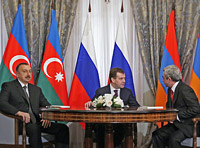The situation with the conflict of Nagorno Karabakh has become tense, and it is not excluded that it may be even dangerous for Armenia.
The problem is that since the meeting of the presidents of Armenia, Azerbaijan and Russia in Moscow on June 11 there have been announcements that are a reason for certain expectations. On the same day the ministry of foreign affairs of Armenia announced that an agreement had been reached upon certain provisions of the Main principles. “The draft document will be discussed during the next trilateral summit in the end of June,” informed the statement.
Such optimistic announcements are rare in the process of the conflict negotiation. In addition to the optimistic announcement on part of Armenia, the Azeri party announced that certain issues had been agreed upon but there were still issues that had not been agreed. In addition, the Azeri president Ilham Aliyev announced during his visit to Slovenia that positive conditions had been created for the settlement of the conflict. It is hard to remember any phase of the conflict settlement when the approaches of the Armenian and Azeri parties had been close. All these announcements result in expectations that the conflict may be resolved in the near future or at least there will be some improvement. The basement or beginning of such announcements was the one in Deauville in the end of May. In the end of May, in Deauville the heads of the co-chair countries Barak Obama, Nicolas Sarkozy and Dmitri Medvedev announced that the delay of the settlement of the conflict will question the parties’ commitment to reach agreement. After this announcement, which looked like a threatening, the parties had to reach some improvement, and on Saturday Armenia and Azerbaijan made an announcement about such improvement. Now, when the RA foreign ministry’s statement writes that the draft of the main principles will be discussed in Kazan during a meeting in participation of Serzh Sargsyan, Ilham Aliyev and Dmitri Medvedev, we may assume that some document will be signed anyway. “There are some dangers from the prospective of signing a document and I would like to believe that the Armenian authorities will be smart enough and this document will not concern a preliminary agreement to the principles of Madrid,” says the head of heritage faction Stepan Safaryan and adds that the parties may sign not a document on the conflict resolution but a statement.
It is worth mentioning that following this announcement in Deauville the Armenian PM Tigran Sargsyan commented on it in Vienna and said that the OSCE Minsk Group was close to success and the recent announcement of the US, French and Russian presidents proved that fact. According to him, “the Armenian party agrees with the main provisions in the announcement and is ready to perform a political will and reach agreement fast.” “According to our opinion, for this purpose there are objective reasons. It is necessary that our Azeri colleagues perform political will as well and be ready to sign the agreement, which will be the base for future negotiations,” said the Armenian prime-minister.
It is not excluded that there may be a drastic improvement in Kazan. “During the opposition’s rally Levon Ter-Petrosyan said that the final agreement was close. In addition, the announcements of Nalbandyan, Mamediarov and S. Sargsyan came to prove that the opposition leader’s assertion was true. I think that in Kazan Medvedev will try to bring the parties closer to agreement and make them sign a document. I have no doubt. In consideration of the fact that the approaches of the parties are closer now, there is a big possibility that Medvedev can do it and the parties will sign a document,” says ANC representative Vladimir Karapetyan and adds that it is about the main principles of Karabakh conflict settlement.
The entire political spectrum is waiting for the meeting in Kazan to see if the parties will sign a document on the conflict settlement or it will be just an announcement such as a memo of understanding or commitment to continue the peace process. Or, the parties may sign an agreement on non-application of force that has been rejected by Azerbaijan for a long time. However, the processes and announcements show that hardly Sargsyan and Aliyev may escape from signing a document in Kazan. “The announcement of Deauville was a message to both presidents stating that in the past the presidents have taken a commitment to sign under those principles. Thus, if they do not do anything, it means they are giving up on their commitment. Thus, the parties have nothing to do but make announcements that they agree with that announcement but inside they have other plans,” says S.Safaryan.
The announcement of Deauville is like a sword of Domacles and it is hard to imagine how the approaches of the parties may be brought closer. The main issue that the parties did not agree upon was the issue of Karabakh’s final status and the time of organizing a referendum in Karabakh. Azerbaijan wanted it to be organized in a long time or in an indefinite time after returning the regions and refugees. However, the Armenian party wanted to do it in a short period after that process. As elections are approaching in both countries, the co-chairs have great opportunities to press on the parties and make them come to an agreement. Maybe this will be an obligated solution for the parties.

